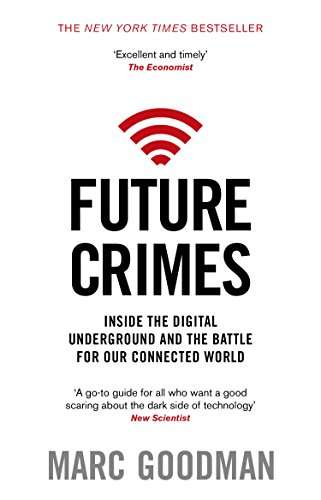Future Crimes: Everyone Is Vulnerable And What We Can Do About Its by Marc Goodman is an amazingly well researched book about cybercrime. He was only 28 and an investigative sergeant in LAPD when he was asked if he knew how to use Word Spell. That was in 1995. He did and he got the job for investing computer crime. That was the birth of computer crime with pages and cell phone now it has grown into a huge industry. And it is going to get worse. Plenty of research has gone into this book and none of it is boring. So even though it is a long book, you will be entranced until the end.
This book covers more venues of computer crime than I ever imagined. Goodman takes us into the underworld of the Internet. This is the world of underground crime. Why are we so vulnerable? Why are we so trusting? This book is frightening because is telling the reality of the new world. If you get scared reading through all the avenues of computer crime, just hang around until you get to the last two chapters. That one will give you and businesses ways to prevent fraud and increase protection.
Password safety, many people use the same password for many accounts? What if you did and someone hacked you Facebook account, then with the additional information on your profile they can get into your bank account, credit cards and more. There is a paradox about the computer, even though it is extremely helpful, it can be dangerous when the wrong people use it for their gain. In the last two chapters, the author explored what can be done to make us safer and how we can use computers to help mankind.
Technological advances have benefited our world in immeasurable ways, but there is an ominous flipside. Criminals are often the earliest, and most innovative, adopters of technology and modern times have lead to modern crimes. Today's criminals are stealing identities, draining online bank-accounts and wiping out computer servers. It's disturbingly easy to activate baby cam monitors to spy on families, pacemakers can be hacked to deliver a lethal jolt, and thieves are analysing your social media in order to determine the best time for a home invasion.
Meanwhile, 3D printers produce AK-47s, terrorists can download the recipe for the Ebola virus, and drug cartels are building drones. This is just the beginning of the tsunami of technological threats coming our way. In Future Crimes, Marc Goodman rips open his database of hundreds of real cases to give us front-row access to these impending perils. Reading like a sci-fi thriller, but based in startling fact, Goodman raises tough questions about the expanding role of technology in our lives. Future Crimes is a call to action for better security measures worldwide, but most importantly, will empower readers to protect themselves against these looming technological threats - before it's too late.
In the last two chapters, the author explored what can be done to make us safer and how we can use computers to help mankind.

